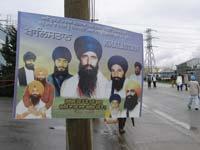Sikh exiles hope to visit their homeland

The Punjab State government in India has made secret overtures to New Delhi to allow 46 Sikh exiles, many of whom have been linked to separatist terror groups, and allow them to return to their homeland.
Among those on the so called blacklist is Ajaib Singh Bagri, the fiery Indo-Canadian preacher from Kamloops, B.C. who was acquitted of the Air India bombing, Canada’s biggest mass murder.
Bagri was also charged with the 1988 attempted murder of Tara Singh Hayer, the publisher of the Indo-Canadian Times. The case against Bagri was stayed in January 2004. Hayer was shot and killed in 1998. His murder hasn’t been solved. He would have been a witness at the Air India trial.
According to a report published in The Hindustan Times, the Punjab government has sent a secret communication to the central government in New Delhi seeking to remove the names from blacklist of separatists like Gurmit Singh Aulakh and Ganga Singh Dhillon both US citizens who set up Khalistan Government-in-exile, Avtar Singh alias Tari of the outlawed Khalistan Liberation Force(KLF), Shingara Singh and Resham Singh, both top Babbar Khalsa leaders settled in France and Germany respectively and Bagri.
None of them are wanted in any criminal case in India.
The paper said the move last week is probably aimed to make an impact on radical Sikhs to get their support in SGPC (Sikh parliament) elections due by the end of this year.
The Indian government blacklisted Sikhs involved in anti-India propaganda and vandalism following the infamous Operation Bluestar of 1984. The Indian army at that time stormed the Golden Temple, the holiest shrine of the Sikhs in Amritsar, Punjab, to flush out the armed religious extremists, who had fortified the place of worship.
The operation infuriated Sikhs across the world, compelling idealistic, emotional youths to join militant ranks. There were angry protests in Vancouver as well, where several men vandalized the Indian consulate office. Subsequently, the government of India blacklisted Sikhs involved in separatist activities, citing security concerns.
Although no official record is available to suggest how many Sikh rebels are on the blacklist, most of the Sikh exiles are now primarily settled in Canada. Others are in the U.S., Britain, France and Germany.
The now defunct South Asian Human Rights’ Group (SAHRG), which campaigned for the blacklistees’ cause, estimates that between 70 to 80 Sikhs living in Western Canada continue to be denied a visa and an Indian passport or visas by the Indian government.
The request for amnesty for Sikh rebels settled outside India comes in the wake of the recent visit of Indian Prime Minister Dr Manmohan Singh to Canada where he gave indications of reviewing the list.
Among those in B.C. who has been denied entry to his homeland is Surdev Singh Jatana of Abbotsford. He was associated with the now banned International Sikh Youth Federation (ISYF).
In an earlier interview with the South Asian Post, Jatana claims that he was never involved in violence, but was in the forefront of peaceful protests.
“The situation has changed now and I wish to return to the mainstream,” Jatana had told the South Asian Post.
Jatana, who is a former employee of Canada Post, became a member of the militant ISYF group following Operation Bluestar in June of 1984. There were angry protests in B.C. and across North America following the infamous military operation, which was launched to flush out extremists who had stockpiled weapons inside the holiest shrine of the Sikhs, the Golden Temple in Amritsar, India.
The government-backed military operation resulted in massive destruction to the temple complex.
The army operation was linked to the Oct. 31, 1984 assassination of then Prime Minister Indira Gandhi by two of her Sikh bodyguards. A wave of anti-Sikh violence subsequently swept India, alienating the Sikh community from the Indian mainstream and leaving nearly 3,000 innocent Sikhs dead.
The army operation and the subsequent anti-Sikh pogroms had a far reaching effect on the Sikh community in Canada, the U.S. and Europe, with a number of emotional Sikh men joining a movement for Khalistan, a separate homeland for the Sikhs.
Even in B.C., Sikh protesters stormed the Indian Consulate in downtown Vancouver in the weeks following the initial troubles in India.
Jatana came to Canada in 1969 and visited India twice before 1984. He says Operation Bluestar changed his life. He could not visit his ailing mother, who died in 2001.
Though he was granted amnesty in 2003 and was allowed to visit India, he was later blacklisted again and couldn’t visit India at the time of his brother’s death in 2004.
Another Sikh exile is Kuldip Singh Malhi. An editor of Surrey-based Phulwari, a Sikh cultural magazine, he has not been able to visit India since 1981. Malhi participated in the 1984 protest rally in Vancouver.
“My close relatives were also denied a visa because of my participation in the anti-India rallies,” he said.
Like Jatana, Malhi was also associated with the ISYF and was once accused of assaulting a moderate Sikh in Surrey – although he was acquitted by the B.C. courts.
In addition to the 46 names on the communiqué sent to New Delhi last week, the Punjab State government said it also does not object to another 28 exiles, who face criminal charges in Punjab returning home. They however have to face the cases pending against them or apply to the Indian Home Ministry for an inquiry into their charges.
The Punjab government is also tracking the addresses of 84 other Sikhs named in blacklist, including 11 who are believed to have come from states other than Punjab.









